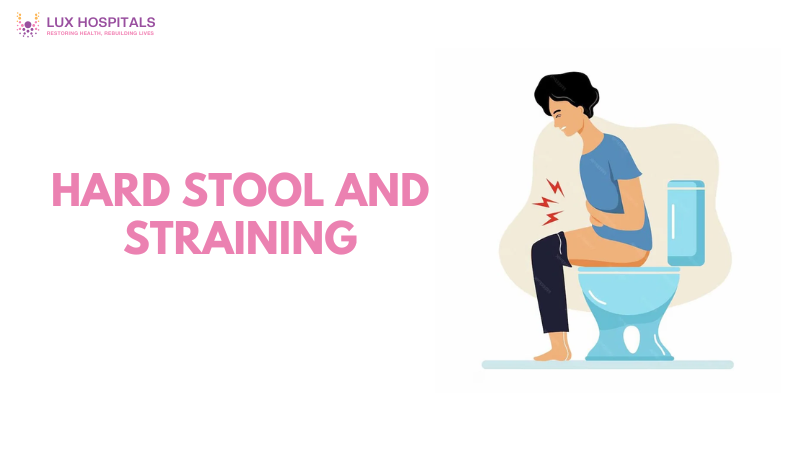Hard Stool and Straining? What Your Body Is Trying to Tell You

Passing stool shouldn’t feel like a struggle, yet for many people, hard stool and straining have become a part of daily life. If you’ve ever sat on the toilet wondering why your bowel movements are painful, infrequent, or look different than usual, you’re not alone.
In this article, we’ll discuss the causes of hard stool, what your symptoms might mean, and when it’s time to take action—because your body is trying to tell you something.
What is Hard Stool?
Hard stool refers to bowel movements that are dry, compact, and often difficult or painful to pass. It can sometimes feel like you’re pushing out small pebbles or a hard mass, leading to straining, discomfort, or even small tears in the anal area (fissures). Many people brush it off, but this symptom can be a red flag pointing to several underlying issues.
Hard Stool Causes:
There isn’t just one reason for hard stools several factors may contribute to this issue. Let’s look at the most common hard stool causes:
1. Low Fiber Diet
Fiber gives your stool more volume and suppleness. Constipation and firm stool can result from diets low in fruits, vegetables, whole grains, and legumes.
2. Dehydration
Water helps keep stool soft. When dehydrated, the colon absorbs too much water from waste, leaving it dry and hard to pass.
3. Delayed Bowel Movements
Ignoring the urge to go can cause your stool to sit in the colon longer, leading to more water absorption and harder stool.
4. Sedentary Lifestyle
Movement helps your intestines stay active. A lack of exercise can slow down your digestion and lead to constipation.
5. Certain Medications or Health Conditions
Painkillers, iron supplements, antidepressants, and some chronic illnesses like hypothyroidism or diabetes can also be reasons for hard stools.
When It’s More Than Just Hard Stool: Black and Alarming
Occasionally, you might notice hard black stool. While diet or iron supplements can darken stool, a black, tarry appearance may indicate bleeding in the upper gastrointestinal tract a sign you should never ignore. If you notice this change, consult a doctor immediately.
Straining Isn’t Normal: Here’s Why You Shouldn’t Ignore It
Straining too much can lead to complications such as:
- Hemorrhoids
- Anal fissures
- Rectal prolapse
- Worsened constipation
It’s not just uncomfortable it’s your body waving a red flag.
Hard Stool Treatment: How to Get Things Moving Again
Now that you understand the causes of hard stools, here’s how to address them. Fortunately, most cases of hard stool can be managed with a few changes:
1. Add More Fiber
Aim for 25–30 grams of fiber daily. Think leafy greens, apples with skin, oats, and flaxseeds.
2. Hydrate
Drink at least 8–10 glasses of water per day. Herbal teas and broths can also help keep your system running smoothly.
3. Stay Active
Just 20–30 minutes of walking or yoga can stimulate bowel movement and reduce the risk of hard stool.
4. Establish a Routine
Try to go at the same time each day, preferably after meals. Don’t ignore the urge — delaying can make things worse.
5. Consider Stool Softeners (If Needed)
Talk to your doctor about short-term options, especially if you’re on medications that can lead to hard stool.
When to See a Doctor?
If you experience:
- Persistent hard stools for more than a week
- Hard black stool
- Bleeding during bowel movements
- Severe abdominal pain or bloating
- Unexplained weight loss
it’s time to seek medical advice. Chronic constipation or changes in bowel habits could signal an underlying condition that needs attention.
Conclusion
Your body is incredibly good at telling you when something’s wrong, and hard stool is one of those signs. Please use the discomfort as a reminder to take care of your digestive health rather than dismissing it or normalizing it. Getting the correct medical help at Lux Hospitals, moving more, or altering your diet are just a few of the many efficient ways to manage hard stool.
Frequently Asked Questions
Hard stool is often caused by a low-fiber diet, dehydration, lack of physical activity, or ignoring the urge to pass stool. Certain medications and medical conditions like hypothyroidism or IBS can also be a reason for hard stool.
Not always, but persistent hard stool may indicate an underlying issue like chronic constipation, IBS, or even a blockage. If it's accompanied by pain, bleeding, or hard black stool, it’s best to consult a doctor.
Hard black stool can sometimes be caused by iron supplements or certain foods, but it could also be a sign of internal bleeding. To rule out dangerous diseases like ulcers or gastrointestinal bleeding, always get medical help.
The most effective hard stool treatment includes increasing fiber intake, drinking plenty of water, staying active, and using stool softeners if advised by a doctor. Treating the underlying cause is key to long-term relief.
To prevent hard stool, eat a balanced diet rich in fiber, stay hydrated, exercise regularly, and react quickly when you feel the need to go to the bathroom. Routine matters—try to keep a consistent bathroom schedule.
In fact, it has an impact on the digestive tract and can lead to hard stools and constipation. Your gut health can be improved by managing stress using relaxation techniques, getting enough sleep, and exercising frequently.
You should see a doctor if you're experiencing hard stool regularly, especially if it's painful, comes with blood, or if you notice hard black stool. Also, consult a professional if dietary and lifestyle changes don’t bring relief.




















